In Memoriam
Carlo Bergonzi, Verdi Tenor
by Liliana Gorini
July 2014
July 31, 2014—On July 25, Carlo Bergonzi, one of the greatest Verdi tenors, died. He had just passed his 90th birthday, on July 12, which was celebrated with a concert in Busseto, the birthplace of Giuseppe Verdi, where Maestro Bergonzi held his master class for “Verdi voices.” I had the pleasure of meeting him there often, and to follow his lessons there, since Bergonzi was one of the most outspoken supporters of the Schiller Institute’s campaign to return to the Verdi tuning (A=432 Hz).
Born in Vidalenzo di Polesine Parmense, near Parma, Bergonzi is considered the most important Verdi tenor of the past century, also because he is the only one who recorded all 31 Verdi arias for tenor. As he told me in the first interview he granted me in Busseto, for the German magarzine Ibykus, he started singing at the Parma Conservatory as a baritone, but in 1950, during the performance of “Madame Butterfly” in Livorno, he tried in his dressing room to shoot the super high “C” which ends the first act, and realized that his difficulty in singing the high notes was due to a lack of technique.
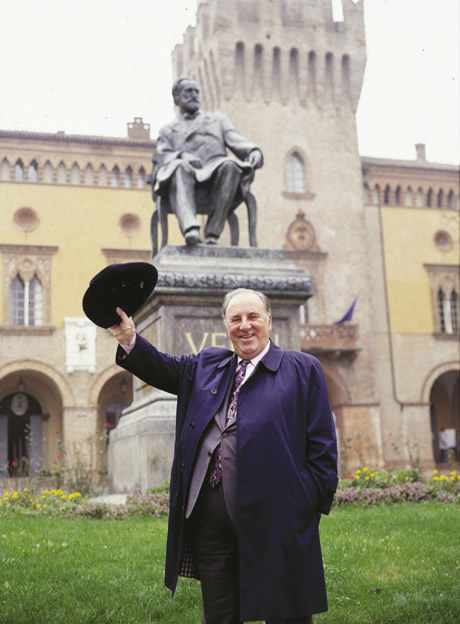 |
Carlo Bergonzi, standing in
front of the Teatro Verdi, and a
statue of the great composer,
Piazza Giuseppe Verdi,
Busseto, Italy (left). The Maestro conducting a
demonstration of singing A=432 vs. A=442, Carnegie Hall, sponsored by the Schiller Institute and the Italian Cultural Institute, April 8, 1993 (below). |
|
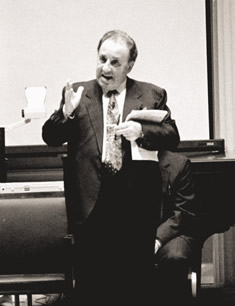 EIRNS/Jessica Tremblay |
Since then, he sang as a tenor, and was a master of tenor technique, particularly its register shifts, not only as a singer but also as a singing teacher, in his Accademia di Voci Verdiane (Verdi Voices Academy) in Busseto. He invited me to attend his lessons there, and I was able to experience his mastery of register shifts and interpretation, for example, when he invited a student to sing the “F” in “Celeste Aida” from “Aida,” keeping it in the second register, instead of shifting to the third register, thereby changing the interpretation of the aria. He often asked his students to speak the line they were singing, in order to give a better interpretation when their singing was boring. “You would never say ‘dell’universo immemore io vivo quasi in ciel’ (forgetful of the univerise, I live almost in Heaven) that way, would you?” he asked a tenor who was singing “De miei bollenti spiriti” from “La Traviata.”
I visited the Maestro often in Busseto, in the Hotel Due Foscari (named for the Verdi opera) managed by his son Marco, and discussed with him the Schiller Institute campaign to return to Verdi’s pitch, and asked him to support it. He often told me, “You are pushy, as are all of you of the Schiller Institute, but that’s the only way to obtain something, so I admire that.”
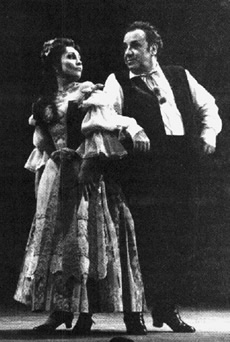 |
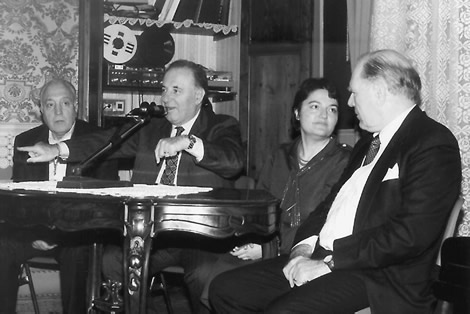 |
|
Bergonzi as Nemorino and Andrea Rost as
Adina, Baltimore Opera production of
Donizetti’s “L’Elisir d’Amore,” 1993. It was
his farewell performance on the opera stage in
the U.S. |
EIRNS
Baritone Piero Cappuccilli, Tenor Carlo
Bergonzi, Liliana Gorini (Schiller Institute),
Lyndon LaRouche, at the 1997 Schiller
Institute conference at the famous Barezzi
House, Busseto, Italy |
In 1997, he participated, together with Lyndon LaRouche and myself, in a conference on Verdi’s tuning held in the famous Barezzi House in Busseto, and attended also by another great Verdi voice, baritone Piero Cappuccilli. Between 1988, when the Schiller Institute held its first conference on scientific pitch and Verdi tuning at the Casa Verdi in Milan, and 1998, he granted interviews1 to our cultural magazines explaining how important Verdi’s tuning is to remaining true to the Maestro’s original color and voice registers, and that today’s high pitch (up to A=448 Hz in Berlin, Salzburg, and Florence) is the reason why there are so few Verdi voices.
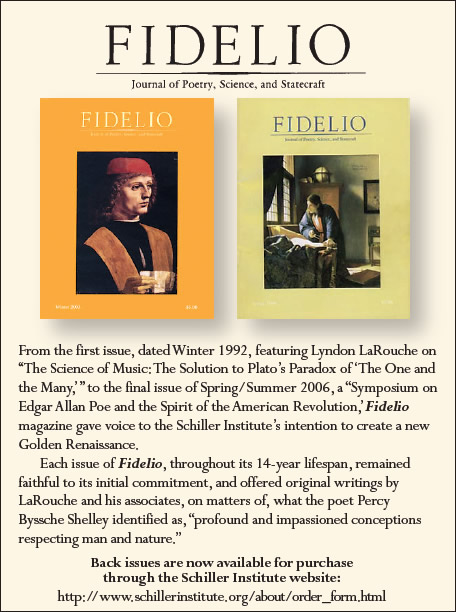 |
Bergonzi once interrupted a rehearsal of Donizetti’s “L’Elisir d’Amore” in Florence, calling the first oboist, who gives the “A” to the orchestra, to his dressing room and demanding that he tune down, since they were performing one full tone higher than the original key!
In 1994, he collaborated with the Schiller Institute, holding a demonstration concert at Carnegie Hall, with New York’s top voice teachers in attendance, where he demanded that voice teachers abandon the “practicality” of preparing their students at the artificially high tuning, and instead train a generation of singers who can once again develop truly “Verdi voices.” His very long career as a Verdi tenor brought him to the Metropolitan Opera, Carnegie Hall—all the most important opera theaters in the world.
We of the Schiller Institute extend our deepest condolences to his widow Adele, who conveyed Bergonzi’s greetings to the Schiller Institute concert on the Verdi tuning, on the occasion of the 200th adniversary of Verdi’s birth, held in Germany, in April 2013.
The world has lost a great tenor and a beautiful soul, in Schiller’s sense, but Carlo Bergonzi will live forever in his recordings and in the memory of his listeners.
Footnote
1. See “Maestro Carlo Bergonzi: Return to the Verdi tuning, ‘or opera could be finished!’ ” Fidelio, Fall 1993.
The author is the chairwoman of the Movisol, the LaRouche Movement in Italy.
